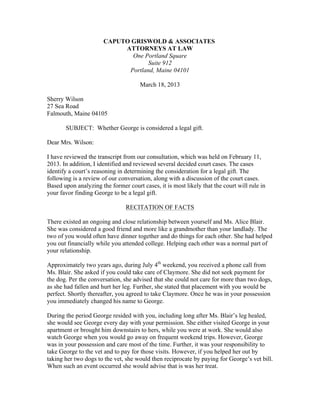Ms. Blair gave her dog Claymore to Mrs. Wilson approximately two years ago. She did not seek payment and said placement with Mrs. Wilson would be perfect. Mrs. Wilson immediately changed the dog's name to George. Now Ms. Blair claims ownership of George. The letter analyzes previous court cases and concludes the court will likely rule that Ms. Blair intended to gift George to Mrs. Wilson when she delivered him, and thus George belongs to Mrs. Wilson as a legal gift.




